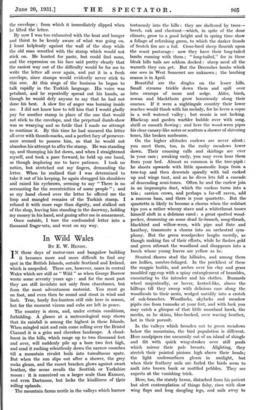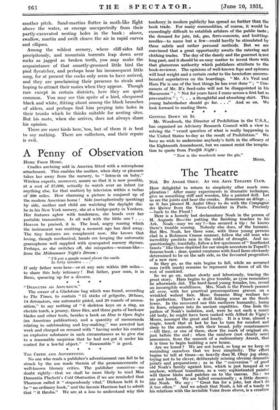In Wild Wales
By E. W. HENDY.
TN these days of motor-cars and bungalow building -I- it becomes more and more difficult to find any spot in the British Islands, outside Scotland and Ireland, which is unspoiled. There are, however, oases in central Wales which nre still as " Wild " as when George Borrow wrote some seventy years ago : and for the most part they are still inviolate not only from charabancs, but from the most adventurous motorist. You must go on foot, and even then be sound and stout in wind and limb. True, hardy fox-hunters still ride here in season, but for the moment vixens and cubs are left in peace.
The country is stern, and, under certain conditions, forbidding. A glance at a meteorological map shows that its rainfall is among the highest in these Islands. When mingled mist and rain come rolling over the Bristol Channel it is a grim and cheerless landscape. A cloud- burst in the hills, which range up to two thousand feet and over, will suddenly pile up a bore two feet high, and send it rushing relentlessly down the narrow coombes till a• mountain rivulet boils into tumultuous spate. But when the sun slips out after a shower, the grey rocks gleam, and the russet bracken glows against swart heather, the scene recalls the Scottish or Yorkshire moors : it is conceived on a larger scale than Exmoor, and even Dartmoor, but lacks the kindliness of their rolling uplands. The mountain farms nestle in the valleys which burrow tortuously into the hills : they are sheltered by trees— beech, oak and chestnut—which, in spite of the dour climate, grow to a good height and in spring time show a foliage of refreshing green, to which the darker fronds of Scotch firs are a foil. Cross-bred sheep flourish upon the scant pasturage : now they have their long-tailed lambs running with them ; " long-tailed," for in these bleak hills tails are seldom docked : sheep need all the warmth they can get. But the December lambs which one sees in West Somerset are unknown ; the lambing season is in April.
Beautiful are the dingles on the lesser hills. Small streams trickle down them and spill over into swamps of moss and sedge. Alder, birch, rowan and blackthorn grow luxuriously along their courses. If it were a nightingale country their lower reaches would throb with his melody, for he loves a copse in a well watered valley ; but music is not lacking. Blackcap and garden warbler bubble over with song, shrill or smooth flowing ; and here the wood-wren pipes his clear canary-like notes or scatters a shower of shivering tones, like broken sunbeams.
On the higher altitudes curlews are never .silent: you meet them, too, in the rushy meadows lower down. Their crooning calls and _ skirlings are ever in your ears ; awaking early, you may even hear them from your bed. Almost as common is the tree-pipit : he shoots upwards with little spasmodic leaps from a tree-top and then descends spirally with tail cocked up and wings taut, and as he dives lets fall a cascade of descending semi-tones. Often he and the curlew join in an impromptu duet, which the cuckoo turns into a trio ; carrion crows, and perhaps a far-off raven, add a raucous bass, and there is your quartette. But the quartette is likely to become a chorus when the redstart tips you a rather wheezy stave and a whitethroat tosses himself aloft in a delirious carol.: a great spotted wood- pecker, drumming on some dead fir-branch, song-thrush, blackbird and willow-wren, with pipe and flute and hautboy, transmute a chorus into an orchestral sym- phony. But the green woodpecker laughs merrily, as though making fun of their efforts, while he flashes gold _ and green athwart the woodland and disappears into a beech whose young leaves are yellow as he.
Stunted thorns stud the hillsides, and among them are hollies, sombre-foliaged. In the prickliest of these the magpie builds, and arches over his clay and grass moulded egg-cup with a spiny entanglement of brambles, excoriating to the intruder and his clothes. Buzzards wheel majestically, or hover, kestrel-like, above the hilltops till they sweep with delicious ease along the woodlands to their nests, wedged untidily into a crotch of oak-branches. Woodlarks, skylarks and meadow pipits rise from tussocks at your feet, and with luck you may catch a glimpse of that little moorland hawk, the merlin, as he skims, blue-backed, over waving heather, hot in their pursuit.
In the valleys which broaden out to green meadows below the mountains, the bird population is different. Here sandpipers rise uncannily out of an island of shingle and flit with quick wing-strokes over still pools which mirror their pale breasts. Alighting, they stretch their pointed pinions high above their heads; the light undersurfaces gleam in sunlight, but when their feathery sails are furled the birds seem to melt into brown bank or mottled pebbles. They are experts at the vanishing trick.
Here, too, the stately heron, disturbed from his patient but alert contemplation of things fishy, rises with slow wing flaps and long dangling legs,, and sails away to another pitch. Sand-martins flutter in moth-like flight above the water, or emerge unexpectedly from their partly-excavated nesting holes in the bank : above, swallow, martin and swift cleave the air in rapid curves and ellipses.
Among the wildest scenery, where cliff-sides fall precipitously, and mountain torrents leap down, over rocks as jagged as broken teeth, you may make the acquaintance of that smartly-groomed little bird the pied flycatcher, and perhaps hear his inconsequent little song, for at present the cocks only seem to have arrived, and they are proclaiming their presence to rivals and hoping to attract their mates when they appear. Though rare except in certain districts, here they are quite common. You may see this sprite of a bird, chequered black and white, flitting about among the black branches of alders, and perhaps find him peeping into holes in their trunks which he thinks suitable for nesting sites. But his mate, when she arrives, does not always, share his opinion.
There are rarer birds here,"too, but of them it is best to say nothing. There are collectors, and their repute is evil.











































 Previous page
Previous page